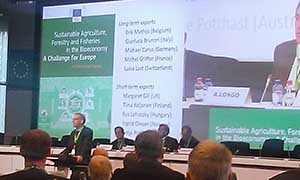Sustainable agriculture, forestry and fisheries
Posted on 16th October 2015
by organicresearchcentre
4th SCAR Foresight report
Sustainable Agriculture, Forestry and Fisheries in the Bioeconomy: A Challenge for Europe
The Standing Committee on Agricultural Research (SCAR) launched its 4th Foresight report in Brussels on 8th October. SCAR was formed in 1974 with the aim of achieving better coordination of agricultural research in Europe, and has an important role in contributing to strategic and operational planning and policy development, as well as helping to shape the European Research Area and the Horizon 2020 programme. In 2014, it widened its remit to extend beyond agriculture and include the bioeconomy sectors of forestry, fisheries and aquaculture and bio-based products. The bioeconomy refers to those parts of the economy that use renewable biological resources from land and sea e.g. crops, forests, fish, animals and micro-organisms, to produce food, material and energy, and it offers an alternative to the current fossil-based economy.
In this latest foresight exercise, the SCAR working group was tasked with exploring the interaction between the primary production sector and the bio-economy. A key question is how the primary sectors are affected by, and can contribute to, the implementation of the bioeconomy strategy and CAP reform. The purpose of the exercise was to identify emerging research questions, anticipate future innovation challenges and explore what might happen by developing the Bioeconomy paradigm within the fundamental constraint of sustainability.
Biomass is defined in its widest sense – as the output of primary sectors (agriculture, fisheries, aquaculture and forestry) as well as by-products and waste streams. The report identifies two premises: first that current biomass is being underexploited i.e. too much waste is not being used optimally, and more material and energy can be extracted from current biomass streams; and second, that biomass potential can be upgraded by closing yield gaps (particularly in Africa and Eastern Europe) and introducing new or improved species and new or improved extraction processes.
Principles for a sustainable bioeconomy
The report introduces five key principles for a sustainable bioeconomy (most of which will sound familiar to those in the organic and agroecological sector:
- Food comes first (the forestry sector contested this
- Sustainable yields
- A cascading approach (biomass is used sequentially as often as possible as material and finally for energy – i.e. don’t burn biomass until it has no other use)
- Circularity (based on 3 principles – waste does not exist, as products are designed for a cycle of disassembly and reuse; consumables should be returned to the biosphere without harm after a cascading sequence of uses; renewable energy should be used to fuel the process)
- Diversity (production services should be diverse, using context-specific practices at different scales and producing a diversity of outputs).
Research themes to address the challenges
The report proposes eight research themes to address the multiple challenges the development of the bioeconomy within the five principles above:
- Ecological intensification – increasing primary production by making use of the regulating functions of nature. Again, familiar to the organic sector….. Research needs to shift from the study of individual species in relation to their environment to the study of groups of organisms or polycultures in relation to each other and their environment
- The digital revolution – such as sensor technology, remote sensing etc. to contribute to precision techniques in the primary sector
- Resilience – research needs to investigate the impact of the bioeconomy on resilience and develop new solutions and systems that are more resilient in terms of biological, technological and social perspectives.
- A new energy landscape – moving from fossil-fuel based technologies to renewable energy technologies. Research is needed to investigate how this transition affects the primary sectors and develop appropriate solutions.
- New business and policy models for the bioeconomy – the concepts of circularity and cascading presents challenges to making economics work, so new business models need to be developed, especially in order to recognise the production of public goods that are not usually remunerated by the market so need public sector involvement.
- Socio-cultural dimensions of the bioeconomy – knowledge about social impacts of technology and mechanisms of social change needs to progress as fast as technology itself. Changes in food production and consumption patterns will break established routines and may create resistance and anxieties which need to be better understood.
- Governance and the political economy of the bioeconomy – research needs to help to develop a framework for supporting the bioeconomy including policies and sustainability and safety standards that are coherent and avoid the overexploitation of natural resources.
- Foresight for the biosphere – to extend foresight to monitor the sustainability and resilience of the bioeconomy and the biosphere as a whole.
The importance of the Knowledge and Innovation System (KIS) as the foundation for research and innovation was recognised in order to develop and spread knowledge and opportunities. Trans-disciplinary KIS that combine multiple theoretical perspectives and practical methodologies should be used to tackle the research questions above.
The report can be found here

